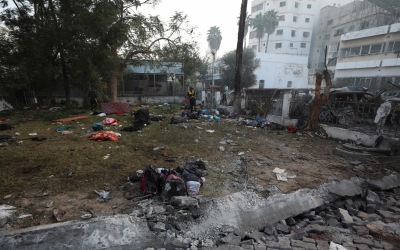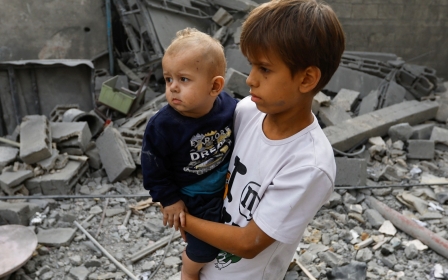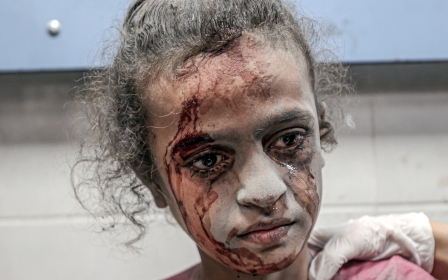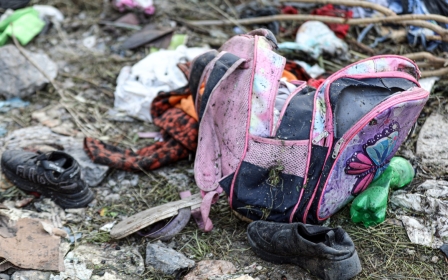In Gaza, the hospital was our last place of sanctuary. Then Israel bombed it
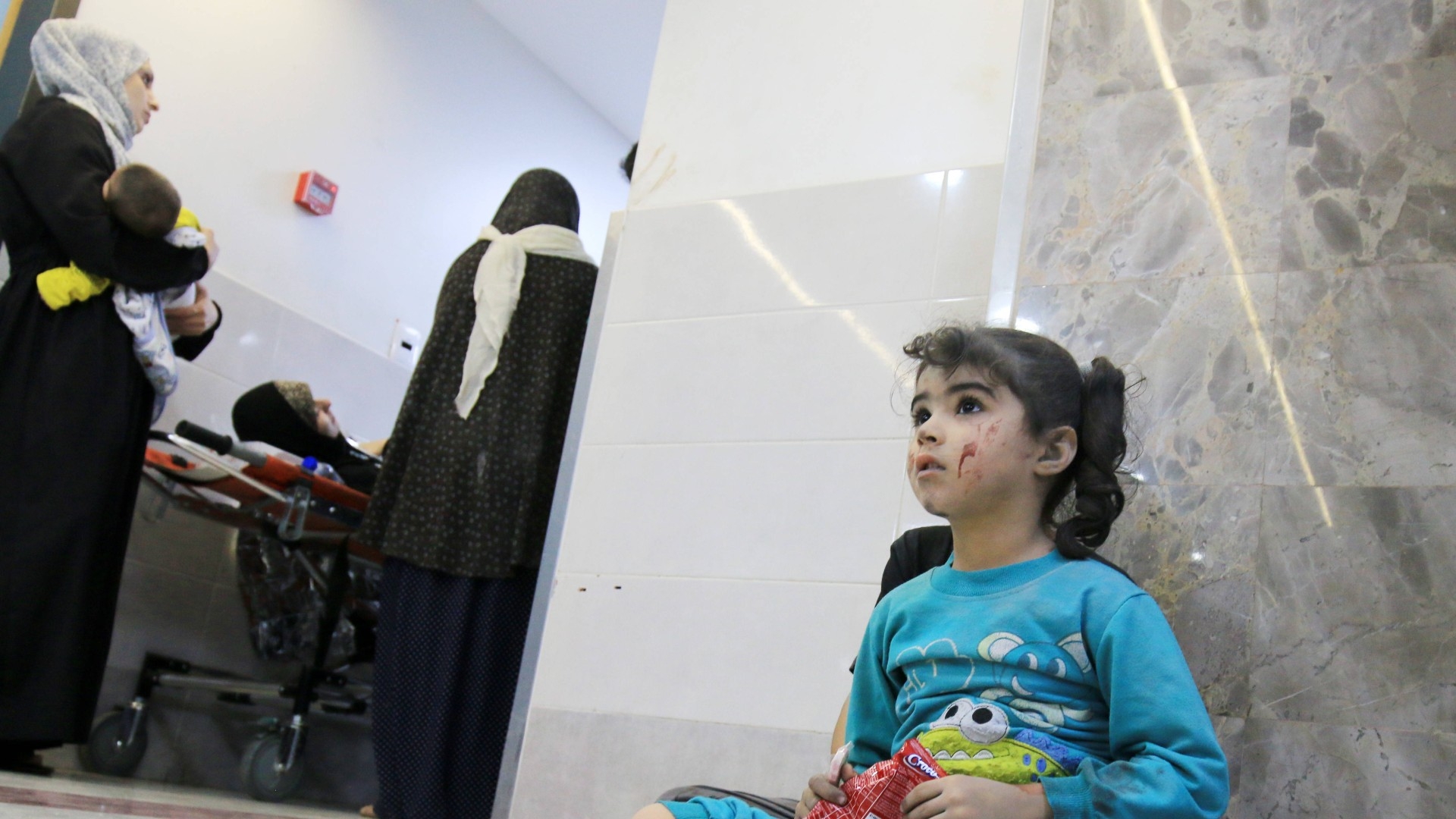
Israel's targeted attack on al-Ahli al-Arab Hospital on 19 October sent shock waves throughout Gaza, exacerbating the already heightened fear among its residents and exposing the harsh reality that even these sacred spaces are not safe from Israel's indiscriminate targeting.
In previous wars, it used to be that the main safety risk was in the journey to the hospital and not the destination itself. A car driving along empty roads made one feel exposed to the drones above that could suddenly deem its passengers a “security threat”.
With looming missile attacks, what was at most a 10- to 15-minute drive, even in congested traffic, would feel like an eternity. A sigh of relief would only come once we'd entered the hospital corridors.
New MEE newsletter: Jerusalem Dispatch
Sign up to get the latest insights and analysis on Israel-Palestine, alongside Turkey Unpacked and other MEE newsletters
Following Israel’s orders to leave their homes, thousands of displaced Palestinian families left their homes in northern Gaza with no place to shelter. Others sustained injuries and had already lost their homes to Israeli bombardment. As electricity and fuel grew more scarce, the entire strip descended into darkness at night, resembling a ghostly city.
Families turned to hospitals, which became the sole providers of electricity, with thousands of people now depending on them to charge their mobile phones and fill their water bottles. More than anything, they hoped for some protection from Israel’s missiles, sleeping in courtyards, hallways, and any open space that allowed it.
Follow Middle East Eye's live coverage for all the latest on the Israel-Palestine war
But the devastating bombing, which killed 471 people, including children, women, and medical staff - and the many displaced individuals who sought refuge within its walls after their homes were destroyed - has forever shattered the perception of hospitals as sanctuaries.
After this terrifying news, I held my breath knowing that my 47-year-old brother, who has long suffered from kidney failure, had a doctor’s appointment the next day. Unable to find a donor match, he needs dialysis three days a week. I continue to fear for my brother’s safety as Israel has already bombed and repeatedly threatened to bomb several other hospitals.
Unrelenting suffering
Located in the al-Zaytoun neighbourhood south of Gaza City, al-Ahli al-Arab Baptist Hospital holds a significant place in Palestine's history. Founded by the Church Mission Society of the Church of England in 1882, it stands as one of the oldest medical facilities in the region - a symbol of compassion and care.
People in Gaza know that Israel enjoys playing with our lives, but many of us wanted to hold on to a glimmer of hope that hospitals would remain untouched
The hospital was also known for its prestigious nursing school, which attracted some of the most accomplished students. The strength of its educational programmes has been widely recognised, producing talented nurses and other healthcare professionals until the mid-1970s.
The night the hospital was bombed was sheer terror. There has always been a recognition among the people in Gaza that Israel enjoys playing with our lives, but many of us wanted to hold on to a glimmer of hope that hospitals would remain untouched.
The situation was so unnerving that even Wael al-Dahdouh, the esteemed Al Jazeera correspondent in Gaza, who horrifically lost his family a little over a week later, struggled to find words to describe the situation.
The harrowing images of the aftermath, those wounded and killed, reminded me of the Sabra and Shatila massacres in 1982, in which Lebanese militias, through the support of the Israeli military, entered the Palestinian refugee camps and proceeded to kill everyone in their way, regardless of whether they were women, children, including infants, or the elderly. They also broke into the camp hospital and killed nurses, doctors, and patients who escaped from the massacre.
I kept thinking of the patients at al-Ahli, many of whom had already narrowly escaped death from Israeli air strikes on their homes and were in the hospital seeking treatment for injuries they sustained. How could the world allow such cruelty - and such crimes - to take place let alone continue more than a week later?
The destruction of the hospital destroyed my faith in human rights, global justice, international law, and everything I once believed in or studied. I am overcome with sadness, anger, grief, and anxiety - feelings that only seem to intensify by the day. With no one willing or able to halt this madness, all we can do is pray for some relief from this unrelenting suffering and loss, while wondering if each day will be our last.
Unfortunately, al-Ahli will likely not be the last hospital targeted by Israeli air strikes. Throughout their ongoing war against the Gaza Strip, the occupying army has regularly threatened to target and attack hospitals where civilians seek shelter, disregarding the internationally recognised norms, ethics, and laws that designate these spaces as safe zones.
No accountability
Perhaps more shocking is that the victims' bodies were not yet cold when western media outlets had already begun crafting justifications for the hospital bombing. As it has long done, Israel denied responsibility, gaslighting the world and claiming that the rocket was a misfire from one of the Palestinian factions.
To justify its indiscriminate bombing, Israel regularly asserts that it cannot identify the exact locations from which the rockets out of Gaza are launched. Yet it was somehow able to investigate the projectile that struck the hospital and immediately identify the alleged trajectory, the group responsible, and other pertinent details.
Even if the West were to believe Israel's version, there is no denying that, over the last two weeks, has killed more than 3,000 children, including 305 in just 24 hours. It is shameful, dehumanising, and appalling - though unsurprising - that US President Joe Biden would raise unfounded doubts about the mounting death toll.
Israel has cut off basic necessities like food and water from the people in Gaza, deliberately destroyed bakeries, and allowed just two humanitarian aid convoys to enter after 14 days of full closure.
On Friday, amidst ongoing heavy bombardment by Israel, Gaza came under total communication shutdown, a move that could potentially shield "mass atrocities", according to Human Rights Watch.
The Israeli military has targeted ambulances, firefighters, and rescue workers trying to help civilians. Even after they denied responsibility for bombing al-Ahli, their leaders continued to taunt us and threaten to bomb more hospitals, including al-Shifa.
The matter extends far beyond a battle of narratives or how Palestinians are perceived. The fundamental issue lies in Palestinians being deprived of our basic humanity and marked for genocide while the world watches in silence.
After five wars, a 16-year siege, and a 75-year brutal occupation, for which Israel has faced no accountability, the people of Gaza have long recognised that everyone fears Israel. Western leaders and media would think a hundred times before holding it accountable for any massacre they commit. They would question whether or not they should bring it to justice despite crystal clear evidence proving that Israel committed those atrocities.
However, nobody dares to accuse it. The concept of accusing Israel these days instils fear in many individuals, leading them to carefully consider the implications of holding it accountable for any alleged massacres.
On the contrary, false and unverified news that demonises Palestinians has spread like wildfire to pave the way for genocide. In instances where misinformation proliferates, like the atrocious lie that Hamas had beheaded 40 babies, responsible news outlets and political leaders have a duty to express regret and acknowledge the deadly role they played in legitimising Israel's genocidal war.
After five wars, a 16-year siege, and a 75-year occupation, for which Israel has faced no accountability, the people of Gaza have long recognised that everyone fears Israel
Numerous massacres have already been perpetrated, resulting in the complete annihilation of entire families with the explicit endorsement of the western powers.
This is not solely about the Ahli hospital; it encompasses the recurring atrocities that are committed under the guise of Israeli "self-defence". Israel continues to receive unwavering financial, military, and political support from the US and other European states.
The US has already deployed the navy aircraft carrier USS Gerald R Ford to the eastern Mediterranean, along with the USS Dwight D Eisenhower aircraft carrier and its accompanying fleet to the region.
As I write this, my 10-year-old niece, Maria, who surprisingly follows and understands these political developments, opened her hands in supplication, loudly praying: "May anything in the world prevent these ships from reaching us! What more could they possibly do?"
This is true. After they bombed the hospital and destroyed any sense of security that remained, I also thought: "What more could they do to us?"
The views expressed in this article belong to the author and do not necessarily reflect the editorial policy of Middle East Eye.
Middle East Eye delivers independent and unrivalled coverage and analysis of the Middle East, North Africa and beyond. To learn more about republishing this content and the associated fees, please fill out this form. More about MEE can be found here.



